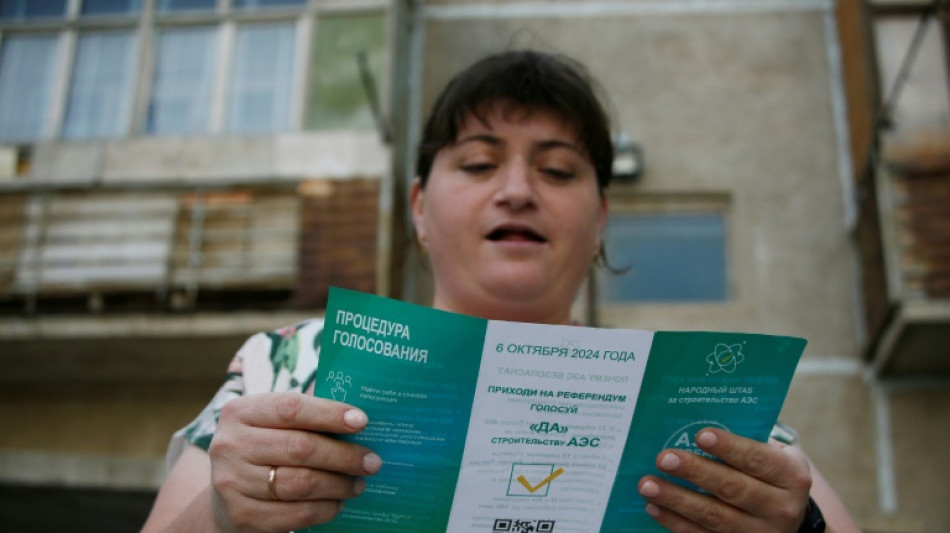
-
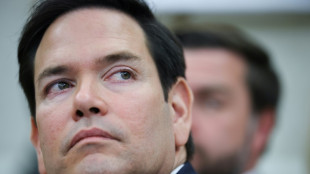 Rubio in Paris to meet Macron on Ukraine war
Rubio in Paris to meet Macron on Ukraine war
-
Asian markets boosted as 'Big Progress' made in Japan tariff talks
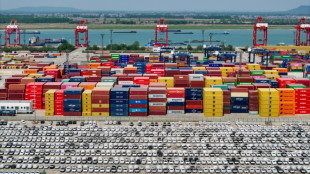
-
 Philippine film legend Nora Aunor dies aged 71
Philippine film legend Nora Aunor dies aged 71
-
Taiwan's TSMC net profit soars as US tariff threat looms

-
 Cartel recruitment at heart of Mexico's missing persons crisis
Cartel recruitment at heart of Mexico's missing persons crisis
-
Macron to hold Ukraine war talks with Rubio, Witkoff in Paris
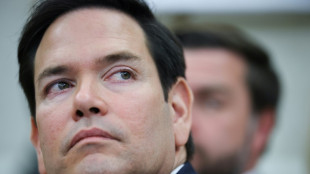
-
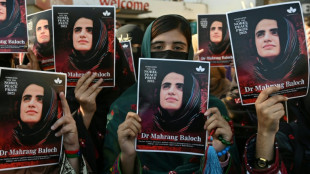 Mahrang Baloch, a child of the resistance for Pakistan's ethnic minority
Mahrang Baloch, a child of the resistance for Pakistan's ethnic minority
-
Myanmar junta says to free nearly 5,000 prisoners in amnesty
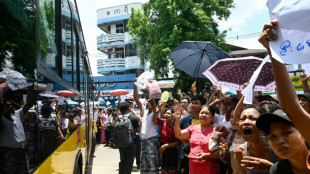
-
 Taiwan's TSMC says net profit rose 60.3% in first quarter
Taiwan's TSMC says net profit rose 60.3% in first quarter
-
Hermes to hike US prices to offset tariff impact
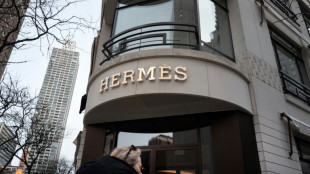
-
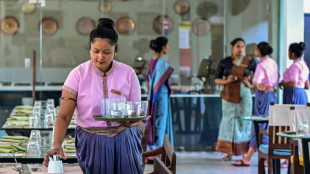 Sri Lanka's women-run hotel breaks down barriers
Sri Lanka's women-run hotel breaks down barriers
-
Sweden turns up Eurovision heat with wacky sauna song

-
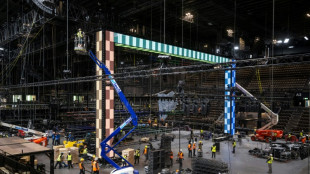 Sweden goes into Eurovision as punters' favourite
Sweden goes into Eurovision as punters' favourite
-
Spanish youth keep vibrant Holy Week processions alive
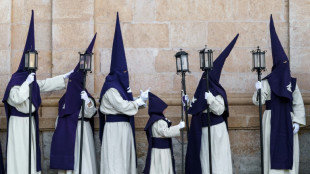
-
 Eurovision promises glitz -- and controversy over Israel
Eurovision promises glitz -- and controversy over Israel
-
Italy's Meloni heads to White House seeking EU tariff deal
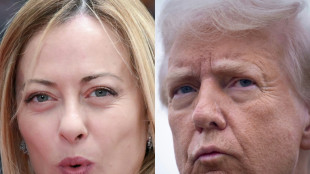
-
 F1 on Jeddah's streets - talking points ahead of the Saudi Arabian GP
F1 on Jeddah's streets - talking points ahead of the Saudi Arabian GP
-
Changing face of war puts Denmark on drone offensive

-
 Anger as China club plays hours after striker Boupendza's death
Anger as China club plays hours after striker Boupendza's death
-
Heat scorch Bulls to advance, Mavericks upset Kings

-
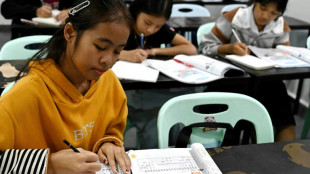 Chinese investment sparks rise of Mandarin in Cambodia
Chinese investment sparks rise of Mandarin in Cambodia
-
Unease grows over Trump tariffs despite 'progress' in Japan trade talks
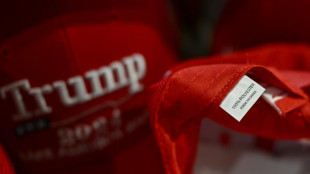
-
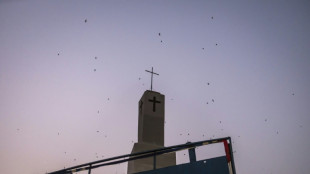 Nigerian mixed-faith families sense danger as violence flares
Nigerian mixed-faith families sense danger as violence flares
-
Asian markets boosted by 'Big Progress' in Japan tariff talks
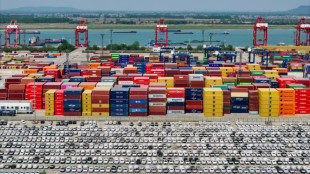
-
 No room for sentiment as Hinault returns to site of world title glory
No room for sentiment as Hinault returns to site of world title glory
-
ECB ready to cut rates again as Trump tariffs shake eurozone
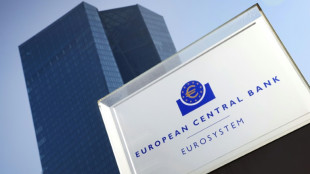
-
 Heat scorch Bulls to keep playoff dream alive
Heat scorch Bulls to keep playoff dream alive
-
Nigeria, Niger foreign ministers meet for security talks

-
 Rugby Australia hits out at French clubs poaching young talent
Rugby Australia hits out at French clubs poaching young talent
-
Canada PM Carney avoids French blunder as he faces attack in key debate

-
 El Salvador becoming 'black hole' for US deportees, critics fear
El Salvador becoming 'black hole' for US deportees, critics fear
-
Trump admin proposes redefining 'harm' to endangered animals

-
 Australia's Mary Fowler set for long lay-off after ACL injury
Australia's Mary Fowler set for long lay-off after ACL injury
-
Rubio to meet French leaders for talks on Ukraine
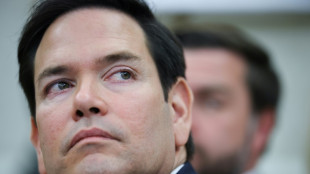
-
 Webb spots strongest 'hints' yet of life on distant planet
Webb spots strongest 'hints' yet of life on distant planet
-
OMP Positioned Highest for Ability to Execute in the 2025 Gartner(R) Magic Quadrant(TM) for Supply Chain Planning Solutions

-
 DEA Diversion Bureaucracy Undermines President Trump's America Pharmaceutical First Agenda
DEA Diversion Bureaucracy Undermines President Trump's America Pharmaceutical First Agenda
-
Evotec SE Unveils New Strategy and Provides 2025 Guidance Bolstered by Strong Q4 2024 Results

-
 Arteta's Arsenal come of age with Madrid masterclass
Arteta's Arsenal come of age with Madrid masterclass
-
None spared in Nigeria gun, machete massacre: survivors

-
 'No problem' if Real Madrid replace me: Ancelotti
'No problem' if Real Madrid replace me: Ancelotti
-
Inter dreaming of treble glory after reaching Champions League semis

-
 'No limits' for treble-hunting Inter, says Pavard
'No limits' for treble-hunting Inter, says Pavard
-
Inter off Bayern to reach Champions League last four

-
 Rice 'knew' Arsenal would dethrone Real Madrid
Rice 'knew' Arsenal would dethrone Real Madrid
-
US stocks fall with dollar as Powell warns on tariffs

-
 Arsenal oust holders Real Madrid to reach Champions League semis
Arsenal oust holders Real Madrid to reach Champions League semis
-
Arsenal defeat Real Madrid to reach Champions League semis

-
 AMD says US rule on chips to China could cost it $800 mn
AMD says US rule on chips to China could cost it $800 mn
-
Inter hold off Bayern to reach Champions League last four


'People will come back': Kazakhstan debates nuclear future
In the semi-abandoned village of Ulken on a giant steppe, Anna Kapustina, a mother of five, hopes controversial plans to build Kazakhstan's first nuclear power plant will breathe life into her ailing hometown.
On the shore of the huge Lake Balkhash and lined with empty buildings, Ulken is at the centre of a raging debate in Kazakhstan -- scarred by massive Soviet-era nuclear testing -- on whether construction should go ahead.
Between 1949 and 1989, the USSR carried out around 450 nuclear tests in Kazakhstan, exposing 1.5 million people to radiation.
The Central Asian country is holding a referendum on the plant this weekend, with President Kassym-Jomart Tokayev, who is pushing for construction, promising to "take important decisions with the support of the people".
The campaign in the authoritarian state has been one-sided, with the vote largely designed to give an air of democracy.
In Ulken, which people left in droves after the fall of the Soviet Union when plans to build a thermal power plant were abandoned, many of the 1,500 remaining residents hope prosperity -- and work -- will return.
"We are waiting for our village to come back to life," said Kapustina, whose husband works as a miner in Aktobe, around 2,500 kilometres (1,550 miles) away.
While rich in oil and the world's biggest uranium producer, Kazakhstan faces chronic electricity shortages, which authorities are hoping to solve.
Kapustina said she was used to having to resort to candles. She hopes a nuclear plant will bring "cheap, uninterrupted electricity".
- Energy shortages -
Amid a huge state-backed campaign, most of Ulken's residents support the project.
But some are weary, fearing for the safety of the Balkhash, the second-biggest lake in a region that already struggles with access to drinking water.
Standing in the yellow fields of a steppe outside the village, engineer Sergei Tretyakov has been "dreaming" about a nuclear plant in Ulken since being sent by the Soviets to help build the abandoned thermal plant.
The 64-year-old thinks Kazakhstan would "simply run out of electricity" without it, with the huge country's south suffering from a particularly acute energy shortage.
Ulken is the perfect spot, he said.
"The soil is resistant and its location allows electricity to be distributed to the north and south," Tretyakov said.
And some of the infrastructure built in the Soviet times is still there.
"We had already built dykes and a cooling pond," he added, pointing to the waters of the immense Balkhash.
That project ended with the collapse of the Soviet Union, and Ulken has been slowly dying ever since -- most residents had left by the early 1990s.
It is now lined with abandoned apartment blocks, its streets little more than dusty tracks.
A mural of the never-constructed thermal power plant adorns a partially empty building.
- Abandoned city -
In a flat that doubles as the town hall, municipal worker Indira Kerimbekova flips through a photo album of Ulken in the 1980s.
"Until the USSR collapse, 10,000 people lived here," she said, showing pictures of packed canteens.
"It's hard to believe now... There were shops, schools, hairdressers."
Today, the only shops are small street grocers, and the nearest hospital is 200 kilometres away.
"We are hoping that if the plant is built, people will come back and will live here," she said.
Pensioner Tatiana Vetrova said people left Ulken because "there was no more work", recalling how residents could make a living only by fishing in Lake Balkhash.
"You had to catch fish, smoke it and sell it on the side of the road," she said.
- Fears for lake -
Many still rely on fishing for their survival, and it is fears for the future of the lake that have driven pockets of opposition against the plant.
"I do not want it," said 62-year-old Zheksenkul Kulanbayeva.
"We are losing the lake. We'll lose the fish. People here mainly make money from fishing," she said.
Even President Tokayev has acknowledged ecological concerns, calling them "understandable given the tragic legacy" of Soviet nuclear testing.
But the government has insisted the plant will be safe and has gone to great lengths to make sure Kazakhs will vote "yes" on Sunday.
Authorities sent representatives of "the people's headquarters for the construction of the plant" -- who are in fact from the powerful presidential party -- to hold "information sessions" across Kazakhstan.
Kulanbayeva was unconvinced. He did not trust billboards around her that read: "Clean energy for the future."
She worried about her town's access to the lake and the ability to fish.
Even residents who have other jobs in Ulken still fish to make extra cash, she said.
"This is what we could lose, I do not want that."
G.Stevens--AMWN



